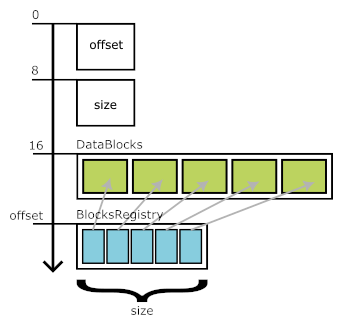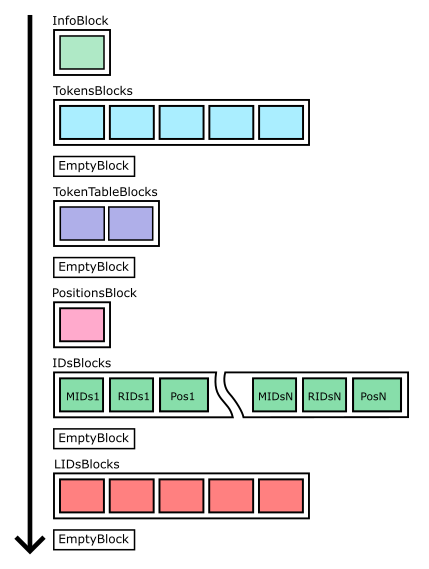Format of Index File of Sealed Fraction
See also
- Fractions
- Format of Documents and Metadata File
- Format of Index File of Sealed Fraction
Index file is a part of fraction data. It has *.index extention and contains index of documents from *.docs file.
High level structure
- 8 first bytes - Offset of BlocksRegistry block from the begining of file (= N + 16)
- 8 next bytes - Size of BlocksRegistry block (= K)
- N next bytes - Section of DataBlocks - a series of different data blocks
- K next bytes - Section of BlocksRegistry block - and index of blocks (offsets, sizes, etc.) in DataBlocks section
This order of sections is determined by the way of writing: each time we write DataBlock on disk we "remember" position, size and possibly other metadata. Then, after all DataBlocks have been written, we write that blocks metadata to the BlocksRegistry section at the end of the file.

DataBlocks structure
DataBlocks consist of 6 sections:
- Section with one InfoBlock (see
DiskInfoBlock.pack()) contains stats data of fraction in json format. - Section with several TokensBlocks (see
DiskTokensBlock.pack()method). Contains a list of sorted tokens. - EmptyBlock
- Section with several TokenTablesBlocks (see
DiskTokenTableBlock.pack()method). Contains an index for TokensBlocks. - EmptyBlock
- Section with one PositionsBlock (see
DiskPositionsBlock.pack()method). Contains an index of DocBlocks in *.docs file, i.e. a list with position of each DocumentBlock. - Section with several IDsBlocks (see
DiskIDsBlock.pack()method). Physically, each IDsBlock represents 3 blocks:- MIDsBlock - just list of MIDs
- RIDsBlock - just list of RIDs
- PosBlock - position of documents. Each position is a uint64 where first 34 bits is index of block (from PositionsBlock) and the rest of 30 bits it is position of document (byte offset) inside DocumentBlock in *.docs file
- EmptyBlock
- Section with several LIDsBlocks (see
DiskLIDsBlock.pack()method) - a list of LIDs sorted by fields, tokens, MIDs and RIDs. In BlocksRegistry we store the range of TIDs for each LIDsBlocks so we can easily find desired block. - EmptyBlock

BlocksRegistry block structure
BlocksRegistry block is a series of fixed-size structuries called IndexBlockHeader. Each DataBlock corresponds to one of the IndexBlockHeader. The order of the DataBlocks is the same as the order of the corresponding IndexBlockHeaders.
There are also an empty BlocksRegistryEntries. Such EmptyBlocks do not have corresponding DataBlock and are used to separate logical groups of DataBlocks from each other.
Format of IndexBlockHeader
See disk/blocks_registry_entry.go
// Format: C : LLLL : UUUU : EEEE-EEEE-EEEE-EEEE : PPPP-PPPP
// C - 1 – Codec
// L - 4 – Length
// U - 4 - Length after uncompress
// E - 16 - Extensions/flags
// P - 8 - Position
// ------------------
// Total: 33 bytes
Extensions/flags part of IndexBlockHeader is intended to help find a desired block in the BlocksRegistry index. So we store in this fields:
- the range of TIDs for each LIDsBlocks. This allows us to choose the appropriate LID block for a particular token.
- the minimal MID and RID for each MIDsBlock. This allows us to choose the appropriate Pos block for a particular MID and RID.
Empty IndexBlockHeader is just 33 zero bytes.